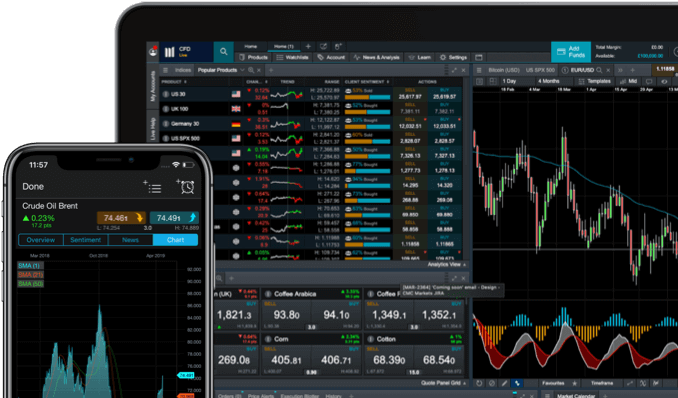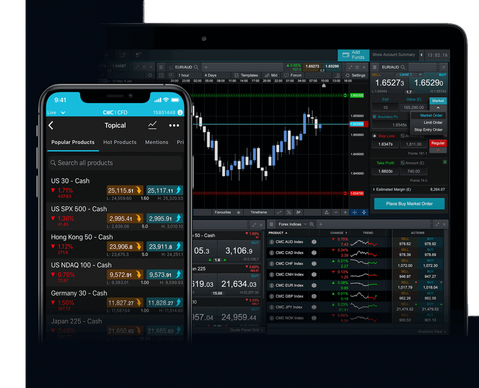
Complete guide to crude oil trading
Crude oil is one of the most actively traded commodities in the world. A raw material that is commonly extracted from Middle Eastern countries, it is referred to as “black gold” and “the mother of all commodities”. Crude oil is used for manufacturing everything from plastics to petroleum, cosmetics to cars, and fabrics to pharmaceuticals.
Trading within the oil markets can be a risky move, given the increased volatility throughout recent years. Where supply and demand is constantly changing, so is the price of oil. However, crude oil is a liquid commodity, meaning that it can be traded in large volumes and boasts a relatively tight spread of around 3.0 points on average. Read on to discover how to trade oil.

Types of crude oil
The type of crude oil depends on the geographic location of the oil field and the characteristics of the oil itself. While there hundreds of types of crude oil traded on the global market, two primary types of crude oil serve as global benchmarks for oil prices: Brent and West Texas Intermediate.
- Brent Crude Oil: Brent oil comes from 15 different oil fields in the North Sea. It is also characterised as a “light and sweet” oil, although it is not as “sweet” or “light” as WTI. Up to two-thirds of global oil contract trades are on Brent.
- WTI Crude Oil: As the name suggests, WTI is sourced from US oil fields primarily in Texas, Louisiana and North Dakota. It is referred to as 'light sweet crude oil' due to its low density and low sulphur content. These characteristics make it less expensive to produce and easier to refine than 'heavy' or 'sour' oils. WTI is the main benchmark for oil consumed in the US.
Why is crude oil a valuable commodity?
Crude oil in particular is considered an extremely valuable resource within the commodities market, as it can be refined into everyday products, such as gasoline, diesel and other petrochemicals, which are consistently in high demand. It is currently the world’s primary energy source. In a modern world, there is an increasing human population and consumption of agricultural and recreational goods. This results in a greater need for energy, and therefore supply and demand is under pressure.
Oil trading prices
Oil prices are highly volatile and heavily influenced by supply, demand and market sentiment. There are a number of factors that affect oil trading prices in the UK, including the following:
- Natural disasters, war, civil unrest
- Seasonal demand
- Population growth
- Global economic growth
- Shipping availability and freight rates
- Alternative fuel developments, including a demand for renewable energy
Oil trading can be a volatile process, so why not practise first on our demo trading account?
How to trade oil
Crude oil can be traded through products that are suited for both long-term and short-term investment, by either buying and selling the underlying asset or using a trading platform to speculate on price movements. Here are the key ways in which you can trade on the oil market.
Crude oil spread betting
Spread betting is our most popular derivative product that allows traders to trade on oil price movements for a wide selection of commodities, including both Crude Oil Brent and West Texas. Spread betting is a leveraged product, meaning that only a percentage of the full trade value is needed as a deposit to open a position. As a trader, you will not own the underlying asset but instead have the ability to speculate on price movements.
Crude oil spread betting can be a risky process as the commodities market is particularly volatile, especially during times of economic crisis or instability. You can trade using our spread betting demo account with virtual funds before opening a live account. Spread betting is an attractive product in the UK, as it allows investors to trade tax-free on thousands of instruments, including both types of Brent and WTI crude oil.
Oil CFDs
Contracts for difference (CFDs) are a type of financial derivative that work in a similar way to spread betting and allow to open a position on crude oil based on whether you think the commodity's price will rise or fall. However, the main difference between CFDs and spread betting lies in tax treatment. Please note that tax treatment depends on individual circumstances and can change or may differ in a jurisdiction other than the UK.
How to trade crude oil futures
Perhaps the most popular method of crude oil trading is through futures contracts, also known as forwards. Oil futures are an agreement to buy or sell an exact amount of oil for a set price at a set date in the future. This type of contract trading is commonly seen within the commodities market due to the volatility of oil pricing. Rather than purchasing oil at its spot price, storing and then waiting for its value to increase within the market to then be sold again, futures prices predict how much the oil will be worth when it expires on the set date. It is an easier way to take advantage of price fluctuations without physically owning the underlying asset. However, trading oil futures can be a risky process as futures prices will also fluctuate depending on the price of oil, which is impacted by many external factors. Read more about futures trading.
Oil ETFs
A slightly different method of oil investment is through ETF trading. Exchange-traded funds are a type of investment fund that can grant traders exposure to the oil market through holding a collection of underlying assets, which in this case would be shares in oil companies. Crude oil ETFs are bought and sold in the same way as many other shares in the stock market. When the price of oil fluctuates, this also has an influence on the share price of oil companies and subsequently, the value of the ETF.
It can be difficult to trade oil stocks in the long-term as the value and price of oil is constantly changing, therefore many traders prefer to use more short-term trading strategies, such as day trading. This way, the ETF value is reflected in the daily price change of oil and it is easier to analyse trends in price charts and graphs in order to predict future movements. Similar to spread betting and CFD trading, an oil exchange-traded fund is a collection of shares that can be traded within the market but the trader still does not own the underlying asset. It is important to remember that leveraged ETFs are complex financial instruments that carry significant risks. Certain leveraged ETFs are only considered appropriate for experienced traders.
Trade on Brent and WTI Crude Oil prices
Oil trading tips
Aside from the trading product that you decide to use, there are also various trading strategies that are better suited for the commodities market. For example, day trading oil is a popular strategy that aims to take advantage of price movements on a short-term basis. As we have discussed, the price of oil can fluctuate often, and although the raw material usually boasts a fairly low spread and a general market stability, it is still possible to make money from small price movements.
Day trading crude oil, along with other trading strategies including news trading and scalping, require an advanced level of technical analysis and understanding of price charts, as they can present many risks.
Fundamental and technical analysis
Crude oil is one of the most liquid commodities within the market, which means that it can be traded in large volumes and there is extensive data to analyse. In order to fully understand the oil market and be able to make future predictions, traders are required to perform some research of their own, including technical and fundamental analysis. This will give an insight into market trends and also help to build knowledge of the asset itself.
For example, fundamental analysis is useful in evaluating the value of oil, through company financial statements, oil trading news releases and the general economic stability of a region that you are trading in. For example, if there is a news announcement of an oil spill or cut in production, this will affect the price of oil and its trading companies, which will need to be factored into your trading strategy. This is considered fundamental analysis.
Studying price charts, graphs and technical indicators to extract numerical information is all part of technical analysis, which usually is the second stage of the process. However, both strategies are needed for oil trading, as the commodity can be highly volatile and therefore it benefits to use a comprehensive perspective.

How to trade crude oil online
- Decide between spread betting or CFDs. Open a live account to start trading oil straight away. Alternatively, you can start practising with £10,000 worth of virtual funds on a demo account.
- Familiarise yourself with our platform. Our award-winning software offers an extensive range of technical indicators including the simple moving average (SMA), Bollinger Bands and stochastic oscillators.
- Choose your preferred asset. There are two popular types of crude oil to trade, and these are Brent and West Texas Intermediate (WTI).
- Research the oil market. Remember that the commodities market can be very volatile, especially in times of political or economic uncertainty. We advise our clients to keep up to date with news and economic insights in order to stay reactive to changes in the market that may affect their positions.
- Build a thorough and effective trading strategy. There are various types of order execution available, and stop-loss orders in particular can help to reduce losses when market volatility is high.
Oil commodity index
With CMC Markets, it is possible to spread bet or trade CFDs on our commodities baskets, which includes our Energy Index. Trading commodity indices allows you to invest in not only one commodity but a collection within the same sector, including Crude Oil Brent, Crude Oil West Texas, Natural Gas, Heating Oil, Gasoline and Low Sulphur Gasoil. This will give you further exposure to the commodities market, while also helping to diversify your trading portfolio.
To find out more about trading on baskets of commodities, visit our commodity indices page.
Crude oil trading platform
Explore our crude oil trading platform, Next Generation. We offer exclusive features for live account holders, such as a trading forum and access to unlimited technical analysis tools. Traders are able to trade our share basket products with a demo account, but a live account will grant you access to stock trading on a vast number of oil companies, such as BP, Chevron, ExxonMobil and Royal Dutch Shell. Open a live account now.

